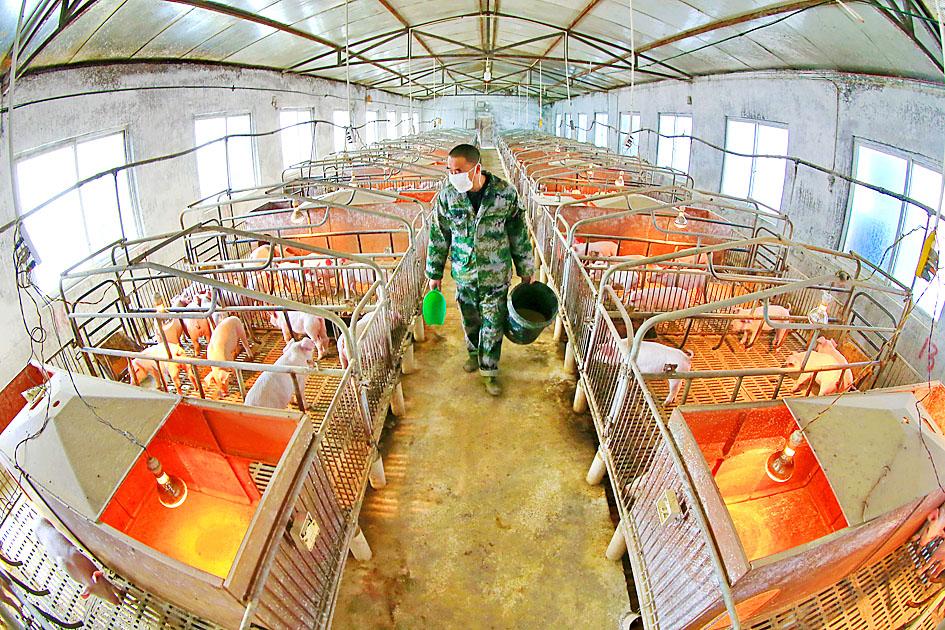China’s farm ministry is touting a complete recovery in pig numbers from the ravages of African swine fever by the middle of this year. Fresh outbreaks of the virus and other lethal pig diseases could pose risks to that outlook.
A resurgence of African swine fever cases in colder northern provinces prompted farmers to slaughter more of their breeding sows before the Lunar New Year, said Lin Guofa, a senior analyst at consultancy Bric Agriculture Group.
Pork is China’s favorite meat and consumption typically booms over the holiday period.

Photo: Zhong Min, EPA-EFE
Other viruses, such as foot-and-mouth disease and porcine epidemic diarrhea, have also taken their toll in outbreaks exacerbated by a harsher-than-usual winter, Lin said.
“The recovery of hog herds in some regions could be delayed, particularly in Shandong and parts of Henan and Hebei,” he said.
It means that as much as 15 percent of the national hog herd might have been lost to disease over the winter, and its full rehabilitation to pre-African swine fever levels is more likely by the second half of next year, said Wang Zhong, chief consultant at Systematic, Strategic & Soft Consulting Co.
The outbreaks have included new variants of African swine fever that have proved less easy to detect and harder to control, he said.
Stabilizing the pig population and reducing market volatility had been a high priority for policymakers ever since African swine fever descended on China’s hog herd, the world’s largest, in 2018.
There is no officially sanctioned vaccine and the epidemic caused the number of pigs to nearly halve, spurring a spike in pork imports and prices.
Global agricultural markets have been roiled further in the past few months by the Chinese government’s drive to deliver a rapid recovery in numbers, which has led to massive shortages of feed grains and emptied silos as far afield as North America.
China’s hog population had returned to 90 percent of its normal levels by the end of November last year, the Chinese Ministry of Agriculture has said.
The ministry did not respond to a fax seeking comment on its latest forecasts.
Efforts to speed up the release of imported meat held at ports and in cold storage, estimated at about 1 million tonnes, should help keep a lid on pork prices, Lin said.
Live hog futures on the Dalian Commodity Exchange on Monday hit their highest close since the contract debuted last month.

SETBACK: Apple’s India iPhone push has been disrupted after Foxconn recalled hundreds of Chinese engineers, amid Beijing’s attempts to curb tech transfers Apple Inc assembly partner Hon Hai Precision Industry Co (鴻海精密), also known internationally as Foxconn Technology Group (富士康科技集團), has recalled about 300 Chinese engineers from a factory in India, the latest setback for the iPhone maker’s push to rapidly expand in the country. The extraction of Chinese workers from the factory of Yuzhan Technology (India) Private Ltd, a Hon Hai component unit, in southern Tamil Nadu state, is the second such move in a few months. The company has started flying in Taiwanese engineers to replace staff leaving, people familiar with the matter said, asking not to be named, as the

The prices of gasoline and diesel at domestic fuel stations are to rise NT$0.1 and NT$0.4 per liter this week respectively, after international crude oil prices rose last week, CPC Corp, Taiwan (台灣中油) and Formosa Petrochemical Corp (台塑石化) announced yesterday. Effective today, gasoline prices at CPC and Formosa stations are to rise to NT$27.3, NT$28.8 and NT$30.8 per liter for 92, 95 and 98-octane unleaded gasoline respectively, the companies said in separate statements. The price of premium diesel is to rise to NT$26.2 per liter at CPC stations and NT$26 at Formosa pumps, they said. The announcements came after international crude oil prices

DOLLAR SIGNS: The central bank rejected claims that the NT dollar had appreciated 10 percentage points more than the yen or the won against the greenback The New Taiwan dollar yesterday fell for a sixth day to its weakest level in three months, driven by equity-related outflows and reactions to an economics official’s exchange rate remarks. The NT dollar slid NT$0.197, or 0.65 percent, to close at NT$30.505 per US dollar, central bank data showed. The local currency has depreciated 1.97 percent so far this month, ranking as the weakest performer among Asian currencies. Dealers attributed the retreat to foreign investors wiring capital gains and dividends abroad after taking profit in local shares. They also pointed to reports that Washington might consider taking equity stakes in chipmakers, including Taiwan Semiconductor

A German company is putting used electric vehicle batteries to new use by stacking them into fridge-size units that homes and businesses can use to store their excess solar and wind energy. This week, the company Voltfang — which means “catching volts” — opened its first industrial site in Aachen, Germany, near the Belgian and Dutch borders. With about 100 staff, Voltfang says it is the biggest facility of its kind in Europe in the budding sector of refurbishing lithium-ion batteries. Its CEO David Oudsandji hopes it would help Europe’s biggest economy ween itself off fossil fuels and increasingly rely on climate-friendly renewables. While